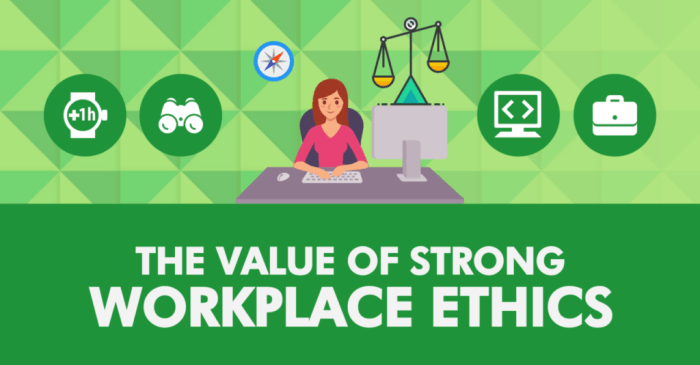In the realm of business, rules about how businesses and their employees ought to behave hold paramount importance. This article delves into the ethical principles, legal frameworks, and employee responsibilities that shape the conduct of organizations and their workforce.
From ethical dilemmas to stakeholder relationships, we explore the multifaceted nature of business conduct and its impact on organizational success and societal well-being.
Business Ethics and Regulations

Businesses have a responsibility to operate ethically and within the confines of the law. Ethical principles guide their decision-making, while legal frameworks and regulations establish the boundaries of acceptable conduct.
Ethical Principles
- Honesty and integrity
- Respect for others
- Fairness and equity
- Responsibility and accountability
- Transparency
Legal Frameworks and Regulations
Businesses are subject to a range of legal frameworks and regulations that govern their operations, including:
- Corporate governance laws
- Antitrust and competition laws
- Environmental laws
- Labor laws
- Consumer protection laws
Ethical Dilemmas
Businesses often face ethical dilemmas that require careful consideration. Examples include:
- Conflicts of interest
- Insider trading
- Environmental sustainability
- Labor practices
- Customer privacy
Employee Conduct and Responsibilities
Employees have a duty to adhere to company policies and procedures and conduct themselves ethically in the workplace.
Expectations and Responsibilities
- Follow company policies and procedures
- Maintain confidentiality
- Respect colleagues and supervisors
- Contribute to a positive work environment
- Avoid conflicts of interest
Importance of Adherence
Adhering to company rules and regulations is crucial for:
- Maintaining a safe and productive work environment
- Protecting the company’s reputation
- Ensuring compliance with legal and ethical standards
Misconduct and Consequences
Misconduct by employees can result in disciplinary action, up to and including termination of employment. Examples of misconduct include:
- Theft or fraud
- Harassment or discrimination
- Violation of company policies
- Gross negligence
Corporate Social Responsibility
Corporate social responsibility (CSR) refers to the voluntary actions taken by businesses to benefit society and the environment beyond their legal obligations.
Benefits and Challenges
- Benefits:
- Enhanced reputation
- Increased customer loyalty
- Improved employee morale
- Reduced environmental impact
- Challenges:
- Cost of implementation
- Measuring the impact of CSR initiatives
- Balancing the interests of stakeholders
Examples of CSR Initiatives
- Environmental sustainability programs
- Community outreach initiatives
- Ethical sourcing and supply chain management
- Philanthropy and donations
- Employee volunteerism
Stakeholder Relationships: Rules About How Businesses And Their Employees Ought To Behave

Stakeholders are individuals or groups with an interest in a business. Managing stakeholder relationships effectively is crucial for business success.
Key Stakeholders
- Customers
- Employees
- Shareholders
- Suppliers
- Local communities
Importance of Managing Relationships, Rules about how businesses and their employees ought to behave
Effective stakeholder management helps businesses:
- Build trust and credibility
- Identify and address stakeholder concerns
- Align stakeholder interests with business objectives
- Create a positive reputation
Strategies for Managing Relationships
- Communication and transparency
- Engagement and consultation
- Conflict resolution
- Stakeholder mapping
- Relationship management tools
Compliance and Enforcement

Businesses must comply with all applicable laws and regulations to avoid legal penalties and reputational damage.
Mechanisms for Ensuring Compliance
- Internal audits
- External audits
- Compliance officers
- Training and education programs
- Codes of conduct
Enforcement Actions
Enforcement actions can include:
- Fines and penalties
- Injunctions
- Criminal prosecution
- Loss of license or permits
- Reputational damage
Ethical Decision-Making

Ethical decision-making is a process of identifying and choosing the best course of action in situations that involve ethical dilemmas.
Ethical Decision-Making Process
- Identify the ethical dilemma
- Gather relevant information
- Consider ethical principles and values
- Identify potential courses of action
- Evaluate the consequences of each action
- Make a decision
- Monitor and evaluate the decision
Factors Influencing Ethical Decision-Making
- Personal values and beliefs
- Organizational culture
- Legal and regulatory frameworks
- Stakeholder expectations
- Potential consequences
Ethical Dilemmas and Resolution
Ethical dilemmas can arise in various situations. Here are some examples and how they can be resolved using ethical frameworks:
- Conflict of interest:Disclose the conflict and avoid decision-making that could benefit personal interests.
- Insider trading:Adhere to insider trading regulations and avoid using non-public information for personal gain.
- Environmental sustainability:Balance business needs with environmental concerns by implementing sustainable practices.
- Employee discrimination:Ensure fair and equal treatment of all employees, regardless of race, gender, religion, or other protected characteristics.
- Customer privacy:Respect customer privacy by collecting and using personal data only for legitimate business purposes.
Key Questions Answered
What are the key ethical principles that guide businesses?
Honesty, integrity, fairness, respect for others, and accountability.
What are the legal frameworks that govern business conduct?
Laws and regulations vary by jurisdiction but generally cover areas such as antitrust, consumer protection, environmental protection, and labor relations.
What are the responsibilities of employees in the workplace?
To perform their job duties ethically and competently, follow company policies and procedures, and maintain confidentiality.